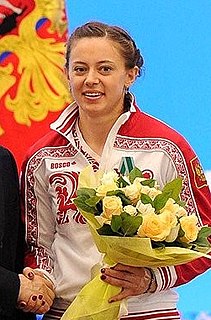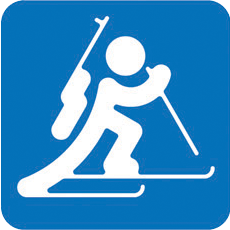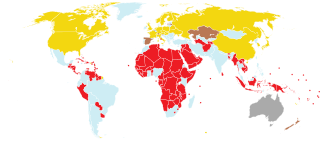
The Winter Olympic Games is a major international multi-sport event held once every four years for sports practiced on snow and ice. The first Winter Olympic Games, the 1924 Winter Olympics, were held in Chamonix, France. The modern Olympic Games were inspired by the ancient Olympic Games, which were held in Olympia, Greece, from the 8th century BC to the 4th century AD. Baron Pierre de Coubertin founded the International Olympic Committee (IOC) in 1894, leading to the first modern Summer Olympic Games in Athens, Greece in 1896. The IOC is the governing body of the Olympic Movement, with the Olympic Charter defining its structure and authority.

The 2006 Winter Olympics, officially the XX Olympic Winter Games and also known as Torino 2006, were a winter multi-sport event held from 10 to 26 February 2006 in Turin, Italy. This marked the second time Italy had hosted the Winter Olympics, the first being in 1956 in Cortina d'Ampezzo; Italy had also hosted the Summer Olympics in 1960 in Rome.
The 2002 Winter Olympics, officially known as the XIX Olympic Winter Games, was a winter multi-sport event held in Salt Lake City, Utah, United States, from February 8 to February 24, 2002. A total of 2,399 athletes from 77 National Olympic Committees (NOCs) participated in these Games, competing in 78 events in 15 sports and disciplines.

Athletes from Belarus began their Olympic participation at the 1952 Summer Games in Helsinki, Finland, as part of the Soviet Union. After the Soviet Union disbanded in 1991, Belarus, along with four of the other fourteen former Soviet republics, competed in the 1992 Winter Olympics as the Unified Team. Later in 1992, Belarus joined eleven republics to compete as the Unified Team at the Summer Games in Barcelona, Spain. Two years later, Belarus competed for the first time as an independent nation in the 1994 Winter Olympics, held in Lillehammer, Norway.

Albina Khamitovna Akhatova is a Russian former biathlete. She was banned for two years for doping.

Australia competed at the 2006 Winter Olympics in Turin, Italy. The team of 40 athletes was the largest ever for Australia, surpassing the team of 31 that participated at the 1960 Winter Olympics.

Russia, officially known as the Russian Federation, has competed at the modern Olympic Games on many occasions, but as different nations in its history. As the Russian Empire, the nation first competed at the 1900 Games, and returned again in 1908 and 1912. After the Russian revolution in 1917, and the subsequent establishment of the Soviet Union in 1922, it would be thirty years until Russian athletes once again competed at the Olympics, as the Soviet Union at the 1952 Summer Olympics. After the dissolution of the Soviet Union in 1991, Russia competed as part of the Unified Team in 1992, and finally returned once again as Russia at the 1994 Winter Olympics.

Kristina Šmigun-Vähi is a former Estonian female cross-country skier and politician. She is the most successful Estonian female cross-country skier with two Olympic gold medals. In 2019 she was elected as a Member of the Estonian Parliament.

Olga Valeryevna Medvedtseva, former Pyleva, née Zamorozova, is a former Russian biathlete.
This article is about the history of competitors at the Olympic Games using banned athletic performance-enhancing drugs.

The 2008 Summer Olympics, officially known as the Games of the XXIX Olympiad, were a summer multi-sport event held in Beijing, the capital of the People's Republic of China, from 8 to 24 August 2008. Approximately 10,942 athletes from 204 National Olympic Committees (NOCs) participated in 302 events in 28 sports.

The 2010 Winter Olympics, officially known as the XXI Olympic Winter Games, was a winter multi-sport event held in Vancouver, British Columbia, Canada, from February 12 to February 28. A total of 2,632 athletes representing 82 National Olympic Committees (NOCs) participated in 86 events from 15 different sports and disciplines.
The Women's 15 kilometre pursuit cross-country skiing competition at the 2006 Winter Olympics in Turin, Italy was held on 12 February, at Pragelato.
The Women's 10 kilometre classical cross-country skiing competition at the 2006 Winter Olympics in Turin, Italy was held on 16 February, at Pragelato.

The 2014 Winter Olympics, officially known as the XXII Olympic Winter Games, were a winter multi-sport event held in Sochi, Russia, from 7 to 23 February. A total of 2,873 athletes from 88 nations participated in 98 events in 7 sports across 15 different disciplines.

Olga Gennadyevna Vilukhina is a former Russian biathlete, who was competing on the World Cup circuit since the 2008–09 season.

Russia competed at the 2014 Winter Olympics in Sochi, from 7 to 23 February 2014 as the host nation. As host, Russia participated in all 15 sports, with a team consisting of 232 athletes. It is Russia's largest Winter Olympics team to date.

Biathlon at the 2014 Winter Olympics was held at the Laura Biathlon & Ski Complex near Krasnaya Polyana, Russia. The eleven events took place between 8–22 February 2014.

The 2018 Winter Olympics medal table is a list of National Olympic Committees ranked by the number of medals won during the 2018 Winter Olympics, held in Pyeongchang County, South Korea, from 9–25 February 2018. The games featured 102 events in 15 sports, making it the first Winter Olympics to surpass 100 medal events. Four new disciplines in existing sports were introduced to the Winter Olympic program in Pyeongchang, including big air snowboarding, mixed doubles curling, mass start speed skating, and mixed team alpine skiing.















